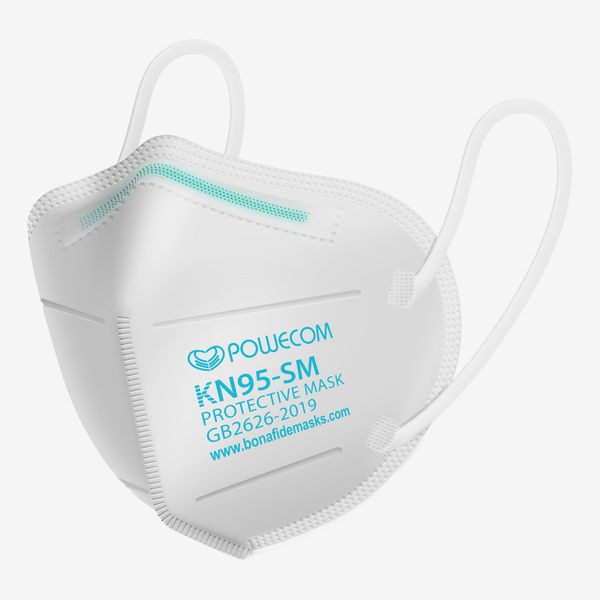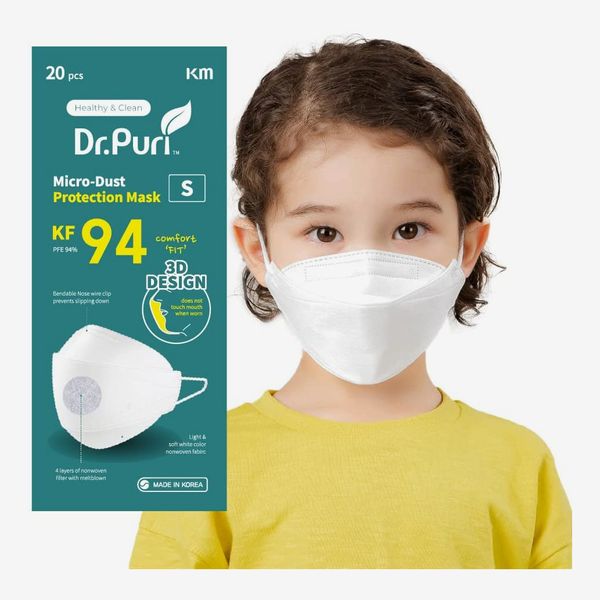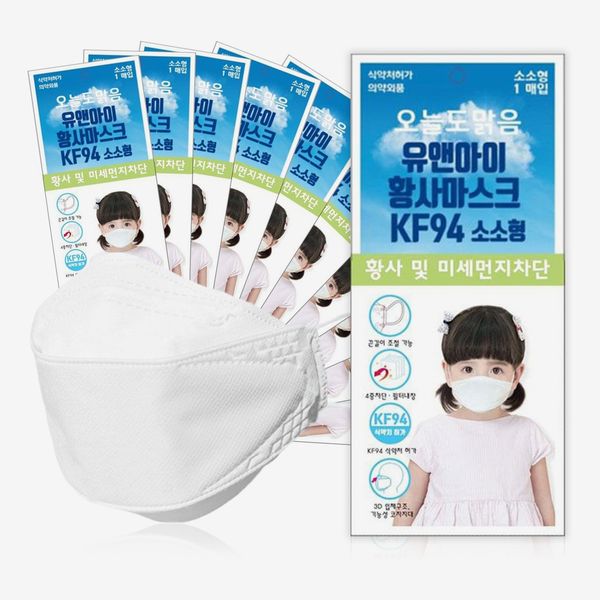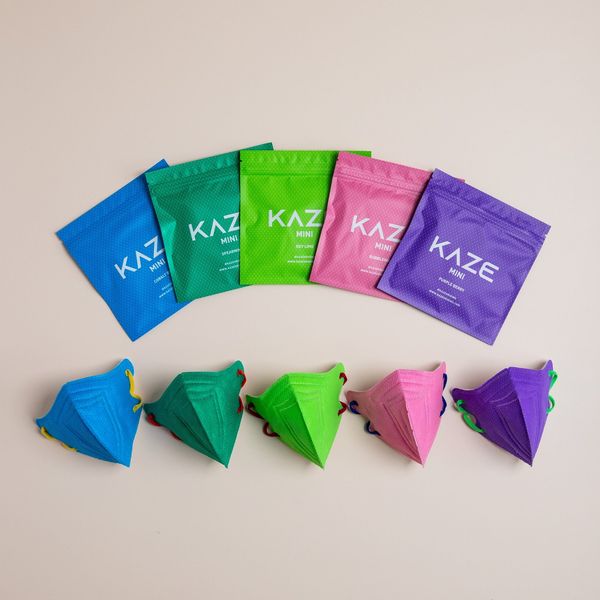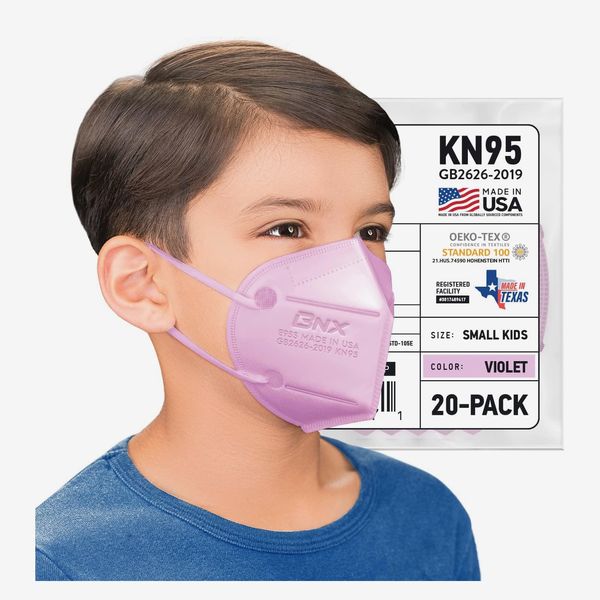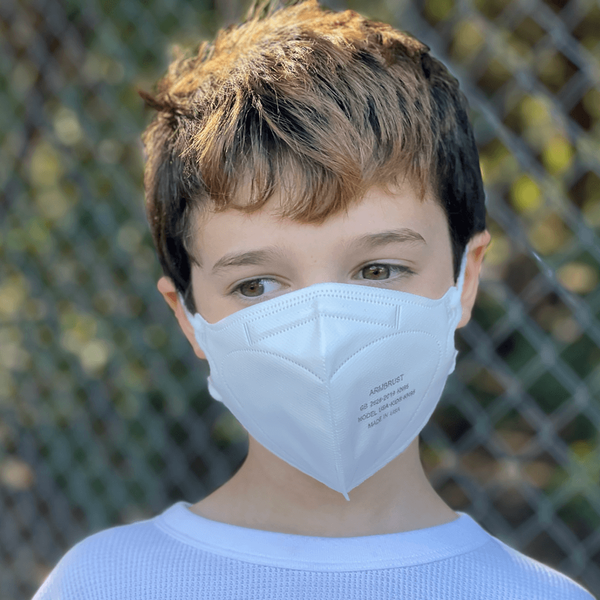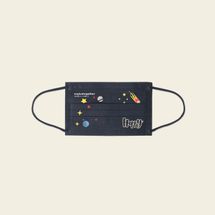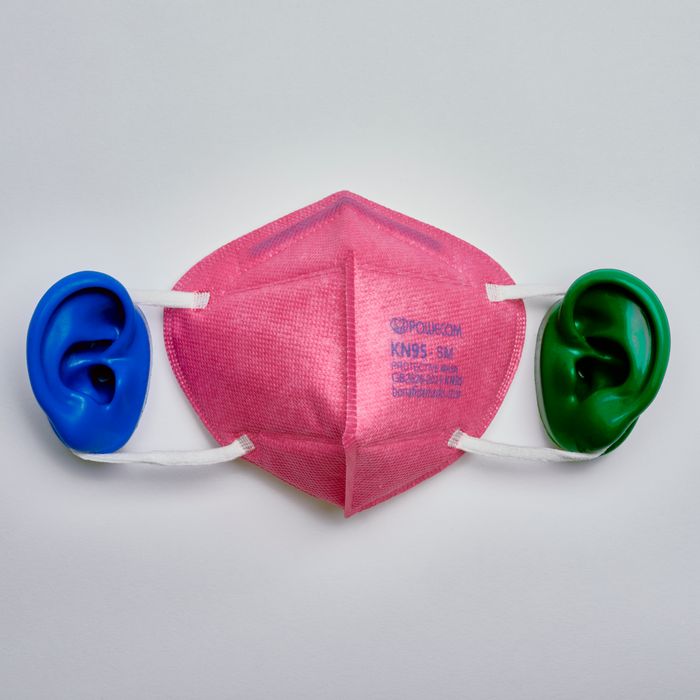
In this article
While masking is optional for children in schools across the country, the CDC still recommends the use of masks to protect children and adults from getting sick when COVID-19 levels are high. And since there are no NIOSH-approved N95 masks for kids, KN95, KF94, and pleated surgical masks — all of which use special nonwoven materials to block tiny aerosol particles — do the best job of stopping the virus’s spread.
Dr. Michael Chang, an assistant professor of pediatrics with McGovern Medical School at UTHealth Houston, says that, unfortunately, tracing the rise of COVID-19 infections in the United States is basically impossible given the prevalence of at-home testing or people not testing at all. But it’s fair to say that winter months, especially in the two-week period following holiday and spring breaks when families travel the most, is a prime time for cases to spike. According to Dr. Ravina Kullar, an infectious-disease specialist, epidemiologist, and spokesperson for the Infectious Diseases Society of America, mask wearing and other infection-prevention strategies like handwashing are still the simplest defense against getting sick.
To help you find the best masks that your children will actually wear, I rounded up a bunch of effective and comfortable KN95’s, KF94’s, and surgical masks for kids that align with the recommendations of experts like Chang, Kullar, and Aaron Collins, a Minneapolis-based mechanical engineer with a background in aerosol science who conducts comparative testing of children’s masks. I also enlisted a handful of kid testers to get first-hand information about the fit, feel, appearance, and even smell of each mask, then asked their parents to share their opinions, too. (And if you’re looking for masks for adults, we’ve got you covered with guides to the best KN95 masks for all ages and the best disposable masks as well.)
What we’re looking for
Authenticity
The same guidelines regarding quality for adult KN95 masks (the Chinese equivalent of an N95) and KF94’s (the South Korean equivalent) apply to masks for kids: They should be made of at least two layers of nonwoven polypropylene plus a melt-blown inner-filter layer, and ideally, they should be independently tested by a third party to ensure proper filtration. A good way to know if you are getting legitimate KF94s is by checking that they are indeed made in South Korea. However, it is extremely difficult to tell a legit KN95 mask from a counterfeit one. Chang says that’s because there is no regulatory agency that ensures a manufacturer actually meets the KN95 standard. According to both Chang and Collins, the best way to avoid fakes is to seek out reputable sources. “In general, don’t buy random brands from Amazon/eBay,” Collins says. “My recommendation is ProjectN95, BeHealthyUSA, KollecteUSA, or, if using Amazon, verify that you are purchasing from the brand’s ‘official’ store.”
The same goes for surgical masks, which Collins says he would skip if you have access to KN95s or KF94s because the standards for surgical masks are much more loose, and the quality can be all over the place. Collins uses a “total inward leakage” test to measure the filtration efficiency and breathability (or pressure drop) of different masks, which gives him more accurate results than other tests that don’t factor in how fit affects filtration. He isn’t an accredited lab, but his data has shown agreement with other published data, and his public Google spreadsheet and YouTube videos have become a lifeline for overwhelmed parents and teachers.
Availability
Many of the children’s masks that Collins has tested (including the one he buys for his own son) go in and out of stock depending on case rates and the timing of the school year. So while the highest-filtration mask on the market might be the ideal choice on paper, the one that performs almost as well but is consistently in stock is the one I prioritize.
Fit
Pediatrician Dr. Brittany DiBardino says the best masks for kids are the ones that fit their faces most securely, covering the nose and mouth completely and creating a tight seal at the edges with no leaks and without causing discomfort. Look for features that improve the fit of a mask such as adjustable ear loops and a flexible nose wire. DiBardino says children should be wearing masks only if they are able to remove them without assistance, to ensure there is no suffocation risk. You may have to try a few before finding the right fit, but if you end up buying a pack of masks that are too big, Dr. Stacy De-Lin, a family-medicine specialist in New York City, says you can tie knots in the ear loops or twist them once before putting them on to get a tighter fit.
Comfort
“A mask doesn’t do any good if it’s at the desk or in a backpack rather than being worn,” Chang says. It also won’t work as well if it is hard to breathe through. You want a mask with some resistance to catch tiny airborne particles, but too much resistance will force the air to find another way in or out — usually around the sides. Lastly, most children have strong opinions about which masks they want to wear. The factors that drive those opinions can involve colors, patterns, or how soft the interior is against their face. If there is a high-quality mask that they willingly put on for school, that mask is probably the best. Dr. Sten Vermund, a pediatrician, infectious-disease epidemiologist, and dean of the Yale School of Public Health, says making mask use fun and gamelike, especially for younger children, will increase the chances they’ll cooperate.
Best mask for kids overall
Powecom KN95 masks were among the very first non-fabric face masks I recommended, and they have consistently held a top spot in my mask roundups since the summer of 2021. Like other KN95 masks, they claim to filter out 95 percent of small particles. But when Collins tested the children’s sized Powecom masks, he found them to have a filtration efficiency of 97.3 percent. They are made of multiple layers of nonwoven polypropylene with a melt-blown fabric-filter layer, flexible nose wire, and latex-free ear loops. The only difference between these and adult Powecom masks, which were on the FDA’s emergency list of approved face masks for health-care professionals at the start of the pandemic, is the smaller sizing (about 15 percent smaller, to be exact). In addition to white, these Powecom masks are now available in two shades of blue, pink, yellow, purple, green, and red.
What we think:
The adult-size Powecom masks are one of two KN95 masks that my husband, a fourth-grade teacher, still wears to work everyday. He says they fit more snugly than most other KN95s he has tried and don’t move when he is talking. And the inside material is soft on the skin. I have comfortably worn them on the subway, on Metro-North, at the airport, and to countless doctors appointments, and I still have never had COVID. Compared to other “bifold” masks, these fit our young test subjects — Strategist senior editor Jen Trolio’s two daughters, who were 4 and 7 years old at the time — the best. Envelope-style KF94 masks were a better fit overall, but we noticed that the Powecom KN95’s were a bit softer and more pliable, meaning they conformed to kids’ cheeks better than stiffer options. The nose wire is also more flexible, allowing for a decent bend around smaller, shallower noses. While they are better suited to older kids (Collins recommends them for children ages 7 to 12, depending on face size), they still offer a decent fit for this style of mask, even without adjustable ear loops.
Best KF94 mask for elementary school kids
If the fit and shape of a KN95 mask isn’t comfortable for your child, have them try a KF94 instead. It’s the shape that fits best and is preferred most by Trolio’s two kids. They open up a bit like an envelope (Collins refers to the shape as a boat) and sit slightly off the face, giving the wearer more room to talk and breathe. These Dr. Puri KF94 masks come in three sizes, the smallest of which is recommended by Collins for children ages 6 through 9. They do not have adjustable ear loops, but the loops can be knotted or twisted to improve the fit. Of the consistently in-stock KF94s he has tested, they have one of the highest filtration efficiencies: 99.4 percent.
What we think:
Strategist writer Lauren Ro bought these masks for her almost 5-year-old son to replace the KF94’s we recommend below, which are now too small for him. She says despite being too large for her son — too loose at the edges and with ear loops that are far too big — the masks come individually packaged and are good quality and very soft. She thinks they would be better-suited to second- or third-graders than kindergartners or pre-K kiddos.
Best mask for preschoolers
Collins features these preschooler-size KF94s on his public Google spreadsheet, showing them to have a very high filtration efficiency of 99.3 percent. They are made in South Korea, of four layers of nonwoven material, with adjustable earloops, and individually wrapped to keep them clean until they are needed.
What we think:
Ro’s son started wearing these masks at age 3 and continued until he grew out of them at age 5. She heard about them through a parent at his preschool, who sourced a bunch of different KF94 masks directly from a Korean importer and tested them all, naming this mask the clear winner. According to Ro, the XXS are perfectly suited for 2- to 3-year-olds, and stayed on her son’s face better than any other mask she tried. “He kept them on instead of constantly pulling them down under his nose and chin.” Ro says, adding that he wore them on cross-country flights, all day at school, and even outside, without complaining about them.
Best colorful KN95 masks
Kaze masks offer the best, most stylish selection of colors and patterns that I have seen among high-quality disposable masks. They are available in adult and kid sizes, both of which are made of five layers of nonwoven material, including an inner melt-blown filter layer. They have been tested by Nelson Labs and certified by the Swiss lab SGS. The ear loops are adjustable, and a foam nose pad helps create a tight but comfortable seal.
What we think:
I was originally drawn to Kaze KN95 masks because of the huge variety of colors available for kids and adults. You can get them in desert neutrals, neon with contrasting ear loops, pastels, and even marbled-paper patterns inspired by the well-known Matches Fashion retail boxes. I was also inspired by the number of stylish celebrities I noticed wearing them midway through the pandemic. Then after trying the adult ones (and feeling pretty cute in them) I got hooked on the comfortable fit and breathability. They are comparable to Powecom masks in softness and breathability. The main downside of Kaze masks, especially if you are considering them for kids who lose things easily, is that they are much more expensive — four times more in many cases — than other masks of similar quality.
Best made-in-America KN95 masks for kids
Accumed’s BNX KN95 masks are manufactured in the United States and have five breathable layers of nonwoven material, including a middle active filter layer composed of melt-blown polypropylene. Impressively, they are even OEKO-Tex certified, meaning they have been tested and found to be free of harmful chemicals. And they are independently tested by Nelson Labs. The ear loops are stretchy yet secure and latex-free. They are available in three sizes: small, medium, and large with the small fitting most children under 12 years of age. Because they are made in the U.S., they are less likely to be affected by supply-chain issues.
What we think:
These are the KN95’s I currently order most often for myself and my husband. They are lightweight and flexible and collapse along my cheeks when I breathe in. When Collins tested them, he found them to have a filtration efficiency of 95.03 percent, which is just a few points below the Powecoms masks. They are soft and smooth on the inside without being fuzzy like some other disposable masks I have tried. So they are less likely to pill from rough handling or after a few wears — or after your kid spends all morning absent-mindedly chewing on one.
Produced in the U.S. with American-made materials, these five-layer Armbrust KN95 masks for kids feature a melt-blown filter sandwiched between two polypropylene layers. They come in six colors: black, gray, white, pink, blue, and purple. And they are available to buy in packs of 20 or packs of five as well as on a subscription basis.
What we think:
Armbrust USA publishes its own comprehensive mask-testing database and claims that their adult KN95 masks have a filtration efficiency of 98.61 percent. When Collins tested the kid-size Armbrust KN95 masks he found them to have a 97.8 percent filtration efficiency. He recommends them for kids ages 6 to 11 years old. The color choices will appeal to kids with strong sartorial opinions. And the fact that they are produced in the U.S. means they are much less likely to be affected by supply-chain issues.
Best surgical masks for kids
We first tested Evolvetogether’s disposable adult masks after former Strategist director of audience engagement Stephanie Downes raved about them back in 2021. Since then I have consistently turned to them in warm weather or for quick indoor-shopping trips. They are also a favorite of my 70-something parents who complain about the fit of KN95’s. Like the adult version, these kids’ masks are tested by an independent laboratory and made of three nonwoven layers that Collins found to block 95 percent of airborne particles. They come in packs of seven or 30 masks and are contained in biodegradable pouches that can be reused for tidy storage. Each set includes a sheet of cute nontoxic stickers kids can use to customize their mask. Evolvetogether also sells a four-layer envelope-shaped mask that provides KN95-level protection, but it is currently out of stock.
What we think:
Because surgical masks have a looser fit that tends to let air escape at the sides, these masks are generally best suited for lower-risk circumstances or quick indoor activities like grocery shopping. But if you have a kid who hates masking, the less restrictive fit and stickers might go a long way in convincing them to put one on. The ear loops aren’t adjustable, but our test subjects, who were 4 and 7 years old at the time, were able to wear them comfortably without complaint. (One of them did comment on how the masks smelled right out of the packaging, and their mother did notice a slight papery odor, but it dissipated fairly quickly.) In terms of the vertical measurement, these masks fit both kids fine, if a little big on the 4-year-old, but the pleats actually helped with that, and because the material is flexible and soft, it didn’t hit her in the neck under her chin the way some larger KN95 masks did.
Our experts
• Dr. Michael Chang, assistant professor of pediatrics with McGovern Medical School at UTHealth Houston
• Aaron Collins, mechanical engineer with a background in aerosol science
• Dr. Brittany DiBardino, pediatrician at Tribeca Pediatrics
• Dr. Ravina Kullar, infectious-disease specialist, epidemiologist, and spokesperson for the Infectious Diseases Society of America
• Lauren Ro, Strategist writer and mom to a 1-year-old and an almost 5-year-old
• Dr. Sten Vermund, pediatrician, infectious-disease epidemiologist, and dean of the Yale School of Public Health
• Jen Trolio, Strategist senior editor and mom to an 8-year-old and an almost 6-year-old
The Strategist is designed to surface the most useful, expert recommendations for things to buy across the vast e-commerce landscape. Some of our latest conquests include the best acne treatments, rolling luggage, pillows for side sleepers, natural anxiety remedies, and bath towels. We update links when possible, but note that deals can expire and all prices are subject to change.

